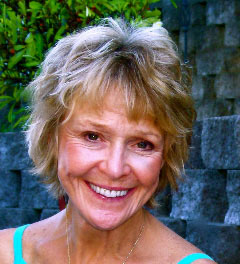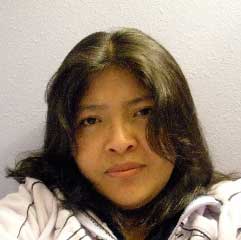|
Features |
|
![]()
IALS program brings people together
On weekends, Linda Prinsen and Rosa Quispe like to stay active. Whether it be biking or hiking, they have a range of favorite activities that keep them moving.
When it comes to relaxing at home, Prinsen said, “We just have a really good time doing common things, like watching ‘Dancing with the Stars’ or ‘American Idol.’” The relationship that has developed is almost that between mother and daughter, even though Prinsen and Quispe have only known each other for a few months. Despite this, Quispe says she loves her “mom.”
Quispe came to the United States from Ingavi in the La Paz region of Bolivia to take part in the two-year Indigenous-Afro-Latino Scholarship (IALS) program at Mt. Hood Community College. While at MHCC, Quispe lives with Prinsen (her host family), studies Natural Resources Management and immerses herself in the United States culture.
“I’m scared because this is all different,” Quispe said. “A different family. I don’t (fully) understand English. My ‘mom’ speaks a little Spanish.”
Prinsen is a retired teacher who taught for 17 years, spending five of those years teaching Spanish which allows her to communicate with Quispe. However, communication wasn’t easy at first.
“Of course, language is a big (barrier.) They (the students) have no English. So they really have to grow and stretch a lot,” Prinsen said.
|
|||
There were also various household activities that Prinsen had to teach Quispe, such as “how to do laundry, how to cook on the stove instead of a fire.”
This is all part of the process, according to Nikki Gillis, CASS/IALS cultural education specialist. CASS, or the Cooperative Association of States for Scholarships, is a program similar to IALS and another Mt. Hood Community College exchange program.
“We look for people (to be host families) who have a schedule that will allow them to interact with their student,” Gillis said. Prinsen added, “I had to slow down and take more time to explain things.”
Gillis said the program looks for people with an “interest in a cultural exchange and inviting someone in to be a part of their family” and a home with “the space for a student.”
The families, according to Gillis, usually approach the school instead of the other way around.
|
|||
Gillis said the number of applicants for host parenting changes. “It’s different each year depending on how many students we receive,” she said.
The families apply and then go into interviews, some of which take place in the home, and have their backgrounds checked before taking in a student. This year there are 25 families for the 40 students, with some families taking in more than one student.
When it comes to pairing families and students, Gillis describes the process as including “a lot of Post-Its,” adding that “we don’t know a lot about the students before they come” and that it comes down to “knowing we’ve got good families and knowing we’ve got good students.”
Prinsen has hosted four other students from various parts of the world through the CASS program.
“(The) first one was from Japan. Then we got another student from Honduras. She’s like a daughter to me now. Then we got a wonderful young man from Guatemala. We got a young man from Panama (as well),” Prinsen said.
Prinsen’s previous experience has shown her that the students are “very respectful, very willing to adapt.” Prinsen said Quispe is unique in that “she’s from a very small community where they speak an indigenous language. It is pretty distinctive.”
When entering the program eight years ago, Prinsen, a single mother, hoped to introduce her daughter Harmony to new people and cultures.
“My daughter loves people. It was sort of like having a big sister or big brother around,” Prinsen said. “I think it’s really colored her whole life in a really positive way.”
Prinsen’s daughter remains a part of the experience, meeting Quispe over Thanksgiving, as well as speaking over the phone. “It was very nice for both of them. They enjoy each other,” Prinsen said. “She’s (Quispe) just a part of my family.”
However, Quispe has a family in Bolivia as well.
“She’s very, very close to (her) family,” Prinsen said. Quispe phones her family every two weeks, which also allows Prinsen to speak with them as well.
“I was so glad to speak to her (Quispe’s mother) directly,” Prinsen said. “(She’s) a wonderful woman. I hope to meet her someday.”
Prinsen had previously written a letter to Quispe’s mother as well.
“I just said that she’s doing very well. Just things that a mother would like to hear,” Prinsen said, mentioning to Quispe’s mother that she would keep Quispe safe and watch out for her during her stay.
When deciding to return to the program this year, Prinsen said the fact that she “love(s) being around people and helping them if I can” was a factor in her decision.
Gillis added that interests play a role in matching students and families.
“We take the little information (we do have) and do the best we can to match students with families of similar interests.”
When Quispe came from Bolivia after being granted the scholarship, she had some goals in mind.
“(I want to) improve my life. I want change in my family, my community. For me, this is a challenge.” The lessons Quispe learns here are to be applied upon her return to Bolivia.
CASS Program Coordinator David Sussman said, “Typically our (graduates) work with governmental agencies, international non-profits with funding from foreign governments, the private sector, and sometimes in education and outreach fields. Eco-tourism is also a field with fast-growing opportunities.”
As for soaking in the American culture, Quispe said, “I want to learn (everything) about it, but it’s impossible.”
After nine to 10 months of living with Prinsen, Quispe will be on her own, finding an apartment and moving out on her own.
“The program assists all the students in getting and maintaining a local apartment during their second year,” Sussman said. “It’s part of their training in living independently which they’ll likely need to do when they return home and get jobs in cities that are much bigger than their more isolated, rural home-towns.”
Expenses will be covered by the program and scholarships, because IALS students are “prohibited to work while in the U.S.,” according to Sussman. “Their living expenses are covered as long as they study hard and maintain their commitment to the program, their professional and personal development, and their (commitment to) return home after graduation to make positive change in their under-developed communities (and) countries.”
Despite this, Quispe and Prinsen already share what Prinsen describes as a “really strong bond.”
“Getting to know each other takes time,” Prinsen said, “(but) she’s a really neat person.”


